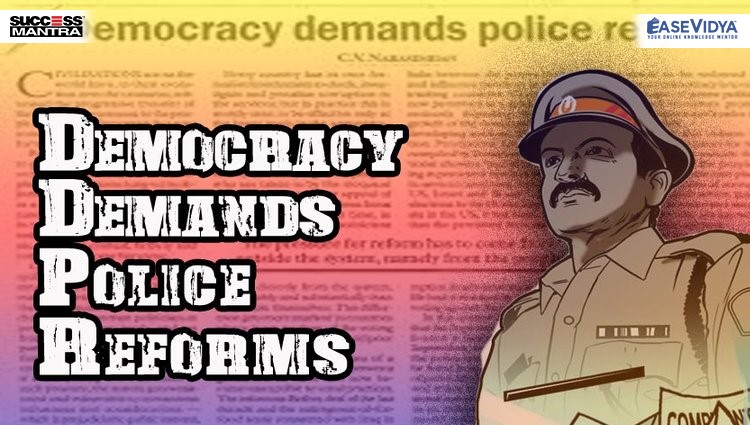
POLICE REFORMS
POLICE REFORMS
Recently, the Vice President of India called for renewed thrust to implement reforms in police forces.
Need of the hour:
- A progressive, modern India must have a police force which meets the democratic aspirations of the people.
- There is a need to upgrade the skills of our policemen to effectively tackle 21st century crimes such as cybercrimes and economic offences.
What is the SC’s Prakash singh judgement on police reforms?
Prakash Singh, who served as DGP of UP Police and Assam Police besides other postings, filed a PIL in the Supreme Court post retirement, in 1996, seeking police reforms.
- In a landmark judgement, the Supreme Court in September 2006 had directed all states and Union Territories to bring in police reforms.
What measures were suggested by the Supreme Court?
- Fixing the tenure and selection of the DGP to avoid situations where officers about to retire in a few months are given the post.
- In order to ensure no political interference, a minimum tenure was sought for the Inspector General of Police so that they are not transferred mid-term by politicians.
- Postings of officers should be done by Police Establishment Boards (PEB) comprising police officers and senior bureaucrats to insulate powers of postings and transfers from political leaders.
- Set up State Police Complaints Authority (SPCA) to give a platform where common people aggrieved by police action could approach.
- Separate investigation and law and order functions to better improve policing.
- Set up of State Security Commissions (SSC) that would have members from civil society.
- Form a National Security Commission.
How did states respond to these directives?
So far almost all states have complied with the seven directives of the Supreme Court issued in Prakash Singh Case.
Model Police Act:
The Central Government has also reviewed the Model Police Act, 2006. Accordingly, a draft Model Police Bill, 2015 has been prepared and placed on the website of BPR&D.
Various committees in this regard:
- There have been the National Police Commission, the Ribeiro and Padmanabhaiah committees, and other commissions which directly alluded to police reforms.
- In addition, the Malimath Committee and the Second Administrative Reforms Commission indirectly expressed requirements for police reforms.
Issues present:
- Colonial Law: The Police Act of 1861.
- Huge vacancies.
- Poor infrastructure.
- Accountability and operational freedom issues.
- Psychological Pressure.













0 Comment